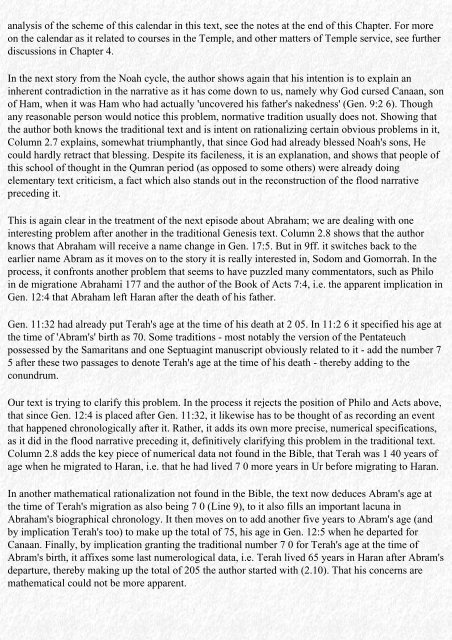Dead Sea Scrolls Uncovered - The Preterist Archive
Dead Sea Scrolls Uncovered - The Preterist Archive
Dead Sea Scrolls Uncovered - The Preterist Archive
Create successful ePaper yourself
Turn your PDF publications into a flip-book with our unique Google optimized e-Paper software.
analysis of the scheme of this calendar in this text, see the notes at the end of this Chapter. For more<br />
on the calendar as it related to courses in the Temple, and other matters of Temple service, see further<br />
discussions in Chapter 4.<br />
In the next story from the Noah cycle, the author shows again that his intention is to explain an<br />
inherent contradiction in the narrative as it has come down to us, namely why God cursed Canaan, son<br />
of Ham, when it was Ham who had actually 'uncovered his father's nakedness' (Gen. 9:2 6). Though<br />
any reasonable person would notice this problem, normative tradition usually does not. Showing that<br />
the author both knows the traditional text and is intent on rationalizing certain obvious problems in it,<br />
Column 2.7 explains, somewhat triumphantly, that since God had already blessed Noah's sons, He<br />
could hardly retract that blessing. Despite its facileness, it is an explanation, and shows that people of<br />
this school of thought in the Qumran period (as opposed to some others) were already doing<br />
elementary text criticism, a fact which also stands out in the reconstruction of the flood narrative<br />
preceding it.<br />
This is again clear in the treatment of the next episode about Abraham; we are dealing with one<br />
interesting problem after another in the traditional Genesis text. Column 2.8 shows that the author<br />
knows that Abraham will receive a name change in Gen. 17:5. But in 9ff. it switches back to the<br />
earlier name Abram as it moves on to the story it is really interested in, Sodom and Gomorrah. In the<br />
process, it confronts another problem that seems to have puzzled many commentators, such as Philo<br />
in de migratione Abrahami 177 and the author of the Book of Acts 7:4, i.e. the apparent implication in<br />
Gen. 12:4 that Abraham left Haran after the death of his father.<br />
Gen. 11:32 had already put Terah's age at the time of his death at 2 05. In 11:2 6 it specified his age at<br />
the time of 'Abram's' birth as 70. Some traditions - most notably the version of the Pentateuch<br />
possessed by the Samaritans and one Septuagint manuscript obviously related to it - add the number 7<br />
5 after these two passages to denote Terah's age at the time of his death - thereby adding to the<br />
conundrum.<br />
Our text is trying to clarify this problem. In the process it rejects the position of Philo and Acts above,<br />
that since Gen. 12:4 is placed after Gen. 11:32, it likewise has to be thought of as recording an event<br />
that happened chronologically after it. Rather, it adds its own more precise, numerical specifications,<br />
as it did in the flood narrative preceding it, definitively clarifying this problem in the traditional text.<br />
Column 2.8 adds the key piece of numerical data not found in the Bible, that Terah was 1 40 years of<br />
age when he migrated to Haran, i.e. that he had lived 7 0 more years in Ur before migrating to Haran.<br />
In another mathematical rationalization not found in the Bible, the text now deduces Abram's age at<br />
the time of Terah's migration as also being 7 0 (Line 9), to it also fills an important lacuna in<br />
Abraham's biographical chronology. It then moves on to add another five years to Abram's age (and<br />
by implication Terah's too) to make up the total of 75, his age in Gen. 12:5 when he departed for<br />
Canaan. Finally, by implication granting the traditional number 7 0 for Terah's age at the time of<br />
Abram's birth, it affixes some last numerological data, i.e. Terah lived 65 years in Haran after Abram's<br />
departure, thereby making up the total of 205 the author started with (2.10). That his concerns are<br />
mathematical could not be more apparent.

















